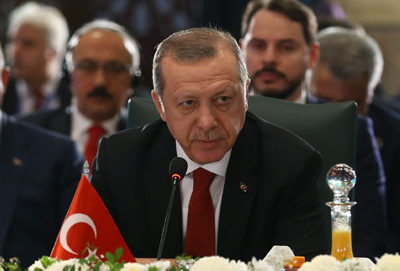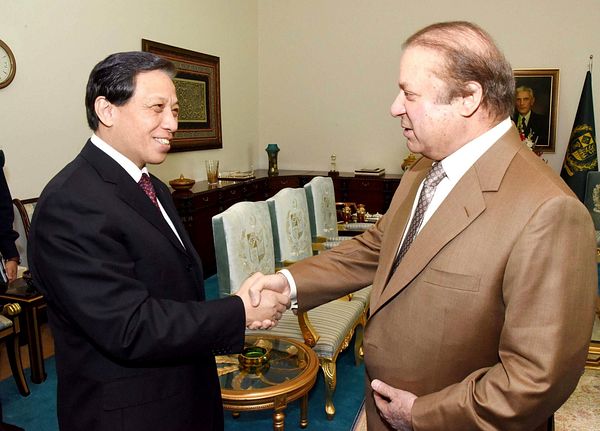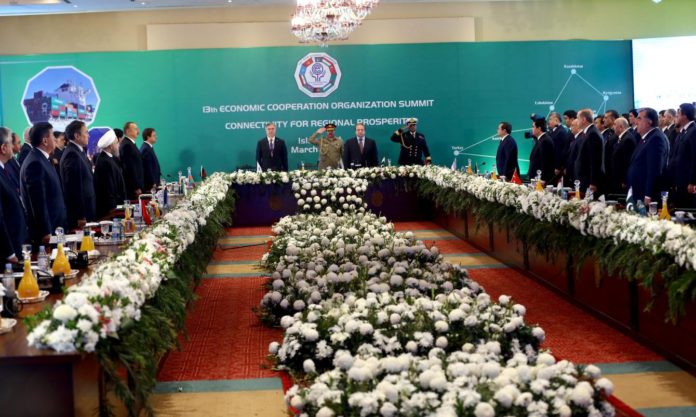The recent Economic Cooperation Organization (ECO) summit in Islamabad was an interesting event. It had symbolic as well as substantive significance. In the symbolic context the event negated Indian Prime Minister Narendra Modi’s articulation about isolating Pakistan internationally. All ten members and three observers participated in the summit, even Afghanistan did not oblige Modi by staying away despite escalated tension between the two neighbors. This is significant and conveys a powerful message about the importance of this summit. Pakistan took a bold initiative to go ahead with the summit time when a new wave of terrorism has rocked the country.
In the substantive milieu, it galvanized political support for the future growth of China Pakistan Economic Corridor (CPEC). The moot welcomed CPEC as a far-reaching initiative that would act as catalyst for the development of the entire region. With the bulk of the corridor expected to be ready and operational by 2025, the future appears promising.
The CPEC is part of China’s strategic ‘One-Belt, One Road’ (OBOR) initiative, which envisages connecting about 64 countries in three continents. President of China Institute of International Studies Mr. Su Ge recently commented, “OBOR will be the largest economic belt in human history that will link Central Asia, South Asia, South East Asia and Africa.”
The Summit agreed to double the current level of intra-ECO trade within the next 3-5 years by implementing the ECO Trade Agreement (ECOTA) and other trade-related instruments formulated by the ECO, alongside identification and elimination of physical and non-physical barriers to trade. Multiple energy projects under the CPEC banner would add 30,000 MW of energy to Pakistan’s national electricity grid over the next 10 years and bring development to Balochistan, Gilgit-Baltistan and the western belt of Khyber Pakhtunkhwa.
The ECO region straddles the centre of the Eurasian land mass and its geography makes it indispensable for East-West connectivity. This region, which was once synonymous with the famed Silk Road, has always been a route for exchange of cultures and ideas. ECO is important for constructive dialogue among member states that has set the direction of development for member states. ECO has significant potential for expanding partnership particularly in vital issues, including security. However, there is need for early completion of reforms in ECO regarding strengthening of ECO Secretariat and evolution of a mechanism for the ownership of projects.
Peace and stability in member states are necessary to promote regional connectivity. In this context, leaders of the ECO states agreed to collectively combat challenges such as extremism, terrorism and drug trafficking to realize collective vision of making the region a zone of peace and prosperity. ECO countries also remain committed to strengthening collaboration to address common challenges such as climate change and food security.

It would be a huge breakthrough if ECO countries join CPEC. ECO is a very important organisation and its purpose was to establish a free trade zone among member countries. CPEC provides requisite connectivity for this purpose. It’s founding members—Turkey, Pakistan and Iran have played a pivotal role in setting up this organization. ECO can play a vital role in building the future of the economy of Central Asia – South Asia region. The current century is the era of emerging economy of Asia. The population of ECO region exceeds 471 million and its GDP has crossed one trillion US dollars. Intra-ECO trade had hyped to 8.7 percent by the end of 2015, which is a reasonable achievement in the context of a beginning with a humble 5.3 percent in 2000.
While unanimously adopting the Islamabad Declaration, delegates of the 13th summit reiterated ‘political will and strong commitment’ for realising mutual aims and objectives for “economic development, common prosperity, regional integration, peace and stability in the ECO region.” The Summit resolved to work together by “positioning the ECO to effectively address these challenges and to seize the opportunities for the collective benefit of the region and its people.” The Summit also adopted the Vision 2025 and reviewed goals laid down in the “Post 2015 Development Agenda”. Sustainability, Integration and Conducive environment were declared as the three core principles of vision 2025 with the Summit emphasizing the need to augment cooperation in the areas of trade, transport and connectivity, energy, tourism, economic growth and productivity, and social-welfare and environment.
Though the Declaration expressed concern about the existing unresolved conflicts in the ECO region, including Armenia-Azerbaijan, but it skipped mentioning the Kashmir dispute and its resolution as per the aspirations of Kashmiris and in accordance with the UN Charter and over a dozen UNSC resolutions on Kashmir. Mentioning the Armenia-Azerbaijan conflict and ignoring Kashmir dispute makes no sense and there is no reason or logic that could justify not mentioning Kashmir in the Islamabad Declaration. If this was skipped on grounds that it involved India which was a non-Muslim state and a non-ECO state, even then it could not be justified because Armenia too is a non-Muslim state and a non-member of the ECO. However, Prime Minister Nawaz Sharif in his inaugural address said: “Pakistan’s commitment to a peaceful neighborhood had been repeatedly demonstrated. To this end, peaceful settlement of longstanding disputes, like Jammu and Kashmir and alleviating the sufferings of the Kashmiri people would greatly help in advancing the goals of stability and development of the entire region”.
The ECO region has enormous potential for enhancing regional cooperation based on the solid foundation of commonality of interests, economic complementarities, common cultural heritage and geographical proximity. It was now time to reclaim ECO’s historic role as Asia’s centre of economic and trade activity. And no other project portrays Pakistan’s conception of win-win cooperation through connectivity, than the CPEC. CPEC is now being recognized as a catalyst for energy infrastructure, transport connectivity and trade in the whole of South and Central Asia. Hence there could not be a better summit theme than “Connectivity for Regional Prosperity”.
Central Asia is fast emerging as a Trans-Eurasian land bridge. Oil and gas pipelines across deserts and mountains are linking markets, while multitude of railroad networks herald global and regional commitment to connectivity. The ECO community could achieve even more by pooling together individual efforts for greater synergy. Indeed ECO’s time has truly come and it is primed to make momentous advancement.

Speaking as the Special Guest, Executive Vice Foreign Minister of China Yesui Zhang said increased regional cooperation in the fields of trade, investment, infrastructure, energy, and other areas would bring development and prosperity to the region. He urged the ECO countries to step up strategic communication and cooperation for greater and in-depth regional cooperation. He said all ECO countries have friendly ties with China in terms of cultural linkages, proximity, and old China Silk Road. Yesui Zhang opined that ECO cooperation could help promote China’s initiative of belt and road cooperation for greater regional integration, development, and prosperity.
ECO Vision 2025, adopted by the Summit, was a significant achievement, which set tangible and pragmatic goals along with an implementation framework. It will help realise the priorities of the organization. ECO members should collectively endeavour to build and promote connectivity in multiple domains, including sea, land, air and cyberspace to give further impetus to intra-regional trade. ECO, at its heart, is about people. It has therefore taken important steps to promote people-to-people contacts, as well as to revive and promote regional tourism. Its steady progress, in various areas of cooperation has, over time, brought its member states as well as people closer. Speaking as Observer, President of Turkish Northern Cyprus Mustafa Akinci said Northern Cyprus wants to contribute more effectively to ECO’s work. He said his country wanted to engage in strong economic, cultural and social interaction with the ECO member states.
ECO initiatives demand commitment and tangible actions for achieving desired goals. Being a founding member of the organisation, Pakistan is committed to ECO objectives such as collective desire for regional integration. Pakistan has the location, political stability, and evolving physical infrastructure to achieve the common vision for making ECO a powerful economic bloc and an engine of growth. The time has come for ECO to make advances for practical realization of the theme of the summit “Connectivity for Regional Prosperity”. No other project better symbolizes Pakistan’s conception of win-win cooperation through connectivity than CPEC. It is now being recognized as a catalyst for energy, infrastructure, transport, connectivity and trade in the whole of South and Central Asia.
The unique geo-strategic location of the region put ECO in an ideal position and it should play its role in building future economies; the ECO could grow as a platform of regional cooperation that would ultimately prosper for the people. However, only desire for making ECO a success is not enough; it has to be accompanied by a full realization of the problems that retarded its progress and the way these can be resolved. There is a need to create necessary institutions to translate the goals into reality. Only institutions have the capacity to continue to pursue the tasks assigned.
The successful ECO summit has also made it clear as to who is a spoiler in the forward movement of South Asian Association for Regional Cooperation (SAARC). On a number of occasions SAARC summits were sabotaged by New Delhi for untenable reasons. For SAARC this a moment of self-reflection, should it continue to be hostage to Indian hubris or transform into a dynamic organization like the ECO?




